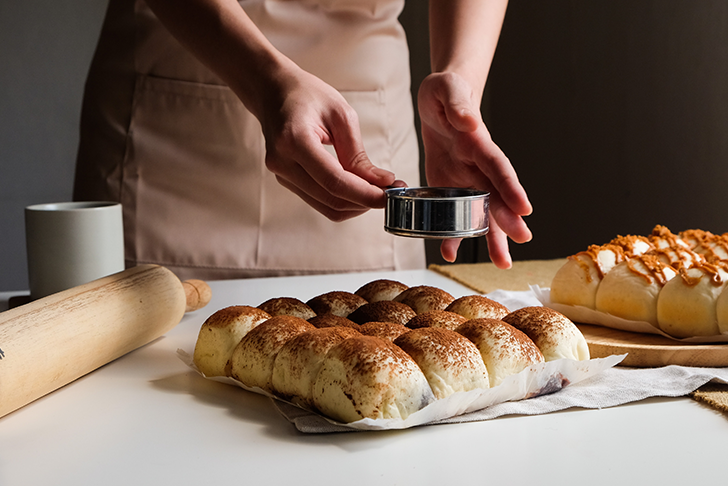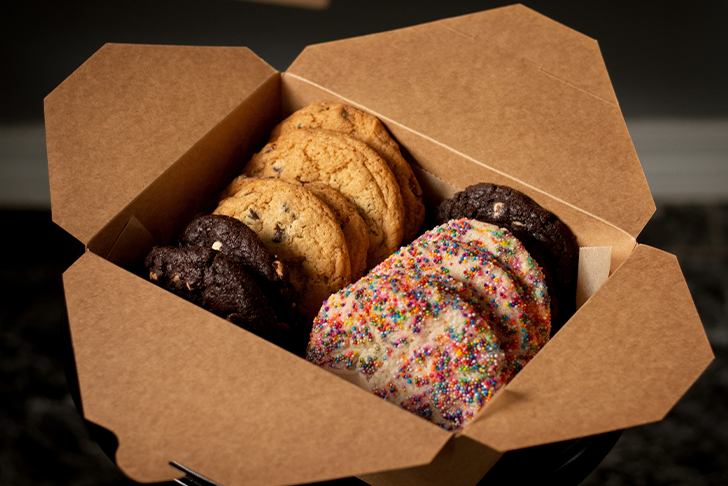Is starting a food business from home profitable?

Yes, selling food from home in South Africa can be profitable, attributed to easy start-up costs and low overheads.
If you enjoy a good fry up in the kitchen, then following your passion for cooking and deciding to start a food business from home could be your next successful business venture.
It’s important to remember that conducting accurate market research, having a solid business plan, and then adhering to all necessary health and hygiene regulations will boost your path to a financially successful business.
There are many options when it comes to selling food from home in South Africa: organic, locally sourced products, jars of preserves, cakes for kids' parties, delicious ready-made meals, and more! Let your imagination run wild!
Home-based cooking classes, corporate catering, or even offering a bespoke dinner service in your home are other creative options that can be guided by your passion for food to make extra money in these tough economic times.
Here is a simple sum to see how much you can expect to make from working for yourself and selling food from home in South Africa:
Selling homemade meals to a few families in your area:
R95 per meal with R25 profit each, sold 5 days a week (Monday - Friday):
8 families/day each ordering 4 meals = 32 meals/day
32 meals/day x 5 days a week = 160 meals/week
160 meals/week x 4 weeks in a month = 640 meals/month
640 meals/month x R25 (profit) = R16,000 profit/month
With the rise of busy, dual-income households, the need for nutritious, ready-to-heat meals that can be frozen or delivered daily in time for dinner is in demand.
Loadshedding is a concern for all South African businesses these days. Cooking with gas is an option, as is managing your power outage schedule in advance when planning your home-based food business in South Africa.
Being cost-effective and affordable in this challenging economy will be vital. Selling food from home will mean that you do not have the capital outlay of renting additional premises and shelling out for expensive kitchen equipment.
Careful planning and well-thought-out contingency plans are key ingredients in your recipe to create a profitable home-based food business in South Africa.
Why should you start a food business from home?

You will want to consider some of the benefits and risks before you start a food business from home. Benefits of your own food business include:
- Increased flexibility when working for yourself
- Reduced overhead costs
- Launching your own cottage industry label
- Combining a passion for food with the need to make money
Risks to consider when you start a food business from home:
- Food poisoning (contamination) and potential legal implications
- Lots of established competition
- Finding the right suppliers who are consistent in their service and pricing
- Unpredictable electricity scheduling
While this may seem like an easy business to start at home, the food industry is not for everyone. Here are personality aspects and skills we think an entrepreneur creating a food home business needs to have:
- Passion for food
- Good cooking skills
- Innovative and creative with recipes, meal planning, and marketing
- Decisive and adaptable (can make timely, nimble business decisions)
- Prepared to take feedback and learn from it (remember, this is a service industry)
Find out more: Need funding? Check out our guide on small business grants.
Start-up costs and funding opportunities

The start-up capital for a home-based food business will be fairly low, as you may already have most of the equipment required in your home kitchen.
Depending on what culinary concoctions you are whipping up, you may need to purchase some additional kitchen equipment, such as:
- Oven: R3,000 - R15,000
- Stove: R3,000 - R20,000
- Microwave: R1,000 - R7,000
- Refrigerator: R10,000 - R20,000
- Freezer: R3,000 - R14,000
- Frying pans, pots, baking trays: R5,000 - R15,000
- Blender: R2,000 - R4,000
- Food processor: R2,000 - R5,000
- Knife set: R2,000 - R10,000
- Ladles, tongs, spatulas: R1,000 - R2,000
- Bowls: R1,000 - R2,000
- Chopping boards: R1,000 - R2,000
Total approximate costs: R34,000 - R116,000
Packaging and labelling will be an ongoing cost and will vary depending on the food products or meals you are selling. Labelling food products with nutritional analysis and allergens is also required for some food products.
Starting a company in South Africa can be an exciting and rewarding experience, but we do know that without sufficient funding you may feel discouraged. There are a range of options you can consider, from small business grants to small business loans.
How do you start a food business from home?
Create your business plan
It is important to formulate a comprehensive business plan on How to Start a Food Business From Home. You will need to look at the following elements:
Who is your target market and what is your product?
Making sure that your product matches your target market is going to be key to your long-term success.
Consider the market preferences in your immediate area. Market research may take the form of asking friends, family, neighbors, or local community groups that you are part of on social media.
Find answers to some of these questions:
- Are there dietary preferences (vegetarian, gluten-free, vegan, or free range)?
- How many meals per week would the average family want to buy?
- Will your clients pay more for meals with organic ingredients, or is keeping the price low a significant factor?
- Who is your local competition? Everything from shops nearby to local restaurants
What will your unique selling point (USP) be?
Knowing your USP will provide you with a more focused marketing strategy that will help to grow your business.
You may decide to offer free deliveries of your freshly made meals, or perhaps you are focusing on a specific dietary requirement. Here are some ideas from local inspiration:
- Keep it local - The Food Club Hub is an example of a food club that operates on principles of sustainability and regeneration: sourcing fresh produce by supporting local farmers.
- Combine flavors - Entree Catering caters to private and corporate events using a unique menu combining flavors from Africa, Asia, and Europe, sourced from local ingredients.
- Vegan and vegetarian - Rooted offers a variety of tasty and nutritious vegan burgers as an alternative to the meat equivalent.
- Child nutrition - Baby Tastes offers a convenient option for baby and toddler meals. They aim to provide meals which are packed with nutrients and full of flavor, offering options to purchase both online and in-store.
How will you sell your product?
When you start a food business from home, there are a variety of options for how to sell your product, from online sales to markets and fairs, to office catering or home-based cooking classes.
Consider all the costs involved in product sales, including the rental of space at local markets, delivery costs, and how you will take payments. You'll also need a mobile point of sale system (POS). You will need to take factors such as food wastage and shelf life into consideration too when catering at events outside of your home.
How will you deliver the food?
Decide how you will deliver your food. Factor in the costs of deliveries and transport. You may consider signing up with a food delivery service such as Uber Eats.
Scaling your business
If you are thinking of scaling up, you will need to consider factors such as:
- Cooking equipment
- Storage space
- Deliveries
- Additional kitchen staff
- Administration staff
What are the primary laws and regulations you need to know to start a food business from home?
South Africa has very clear regulations regarding food businesses. When you start a food business from home you must soon decide what it is you are going to be selling so that you can educate yourself about the applicable laws.
Labelling: nutritional analysis and allergens
You can find all the information about which food products require labelling with a nutritional analysis, as well as which allergens need to be listed, in Regulations R146.
Labelling: shelf-life
Food that is not eaten immediately after being prepared will need to be labelled with a “best before date” or “expiry date” on the product.
You will need to conduct a shelf-life study to know how long your product can stand on the shelf before it becomes unsafe for consumption.
Health and hygiene systems and protocols: Standard Operating Procedures (SOP)
Below are some things to keep in mind regarding health and hygiene. All of these are aimed at preventing the contamination of food which can cause serious illness.
- Pest control
- Temperature control
- Personal hygiene – to avoid cross-contamination between staff and food
- Cleaning and maintenance of equipment
- Supply chain and related procedures
- Disposal of waste and waste control
Your SOPs should include exact steps on how all of these are maintained and monitored.
Basic food safety requirements
The basic legal requirements for food safety are comprehensively outlined in Regulation R638. These regulations cover everything from handling and transport of food to requirements for food containers, appliances, equipment, protective clothes, and much more.
How do you set up a food business from home?
Register as self-employed
As a small owner-run business, you will have to register for Personal Income Tax, and declare your business income on the Income Tax Return for Individuals (ITR12). You can use this online application to securely complete your registration.
You can read through this helpful leaflet from SARS which provides additional information for SMMEs on tax registrations and payments.
Registration with local authority
If you wish to start a food business from home, you will require a Business License as well as a Certificate of Acceptability of Food Premises. You can apply for both from your local municipality.
Using Annexure A in Regulation R638 you can apply for the Certificate of Acceptability, after which an authorized Inspector will carry out an inspection and then recommend to the local authorities that the Certificate of Acceptability be granted.
Permission from landlord
If you are renting your home and wish to start a home food business from your kitchen then according to South African non-statutory law you will need to include this in your rental agreement with your landlord, who will need to grant their permission.
Food safety procedures
The basic requirements for food safety procedures are extensive and are fully outlined in Regulations 4-13 of Regulation R638.
Food hygiene
According to the World Health Organisation (WHO) foodborne illnesses are usually caused by ingesting food that contains bacteria, viruses, parasites, or harmful chemicals.
There are significant legal implications for not following the correct health and hygiene practices in a food business.
Knowing the correct way to keep your premises clean, and how to prepare, store and transport food safely will help to limit the likelihood of your food becoming contaminated.
Food allergens
According to the Allergy Foundation South Arica (AFSA) some of the major food allergens are: cow’s milk, eggs, fish, crustaceans, peanuts, soybeans, tree nuts, wheat, and goat's milk. In addition, they provide comprehensive and helpful information regarding other uncommon food allergens that one will want to be aware of.
It is very important to label all allergens on your food products as some of them can be life threatening. Regulations R146 provide information about which allergens need to be listed, as well as options for how this can be done on the packaging.
Risk sssessments
To ensure your safety, as well as that of any of your staff, conduct all necessary risk assessments. This may include:
- Fire safety (fire hydrants and evacuation plan)
- First aid to deal with medical emergencies
- SOPs outlining the food supply chain and all health regulations
Delivering food safely
The basic requirements for transporting and delivering food safely are outlined in Regulations 4-13 of Regulation R638.
Keep in mind that you should never transport food:
- with food waste or contaminated food
- in a vehicle that has not been cleaned
- with poison or other harmful substances
Proper food storage
Regulation R638 outlines all requirements for proper food storage. This includes:
- Storage of food in freezers requires a thermometer to monitor the temperature
- Food must be stored in dust-proof containers
- All perishable food stored must be stored in containers that prevent contamination
How to advertise your food business from home

Here are some helpful tips on how you can grow your food business through marketing:
Logo and packaging
Use your logo to create a connection with your market by providing them with a sense of what your business represents.
Include a ‘Proudly South African’ sticker on your packaging (or ‘Tuis Gebak’) so that consumers can see at a glance what your food brand is about. Now is the time to trumpet the fact that local is lekker!
Packaging should reinforce your brand identity, attract potential clients, and give them a sense of the culinary experience they can expect.
For example, healthy meals made from organic ingredients could be packaged in biodegradable containers rather than single-use plastic or polystyrene.
Recycled, sterilized jars for kimchi or bottles for homemade kombucha that customers can return and you can reuse is another way to build customer loyalty.
Selling your food online
Provide attractive images of your food items to give customers a sense of what they are ordering. Consider a simple website with an easy-to-use interface for your clients to order effortlessly.
Social media
Use social media such as TikTok, Instagram, and especially your WhatsApp contacts on your phone (create that broadcast list!) to promote your food brand, direct traffic to your website, or garner daily orders.
Employ your creativity to create content that is visually appealing and emphasizes the delicious tastes your customer can expect to experience – as well as the fun you are having making the food!
By tantalizing your customers with creative videos that introduce them to your food brand, you can also educate them about your niche (the health benefits, why your brand is better than store-bought meals, and offer recipe tips). Establish customer rapport in your DMs while building your own online authority.
Then, connect with other foodie influencers on social media to expand your reach and following. You could also partner with other businesses that are aligned with your brand to offer giveaways, prizes, or specials through competitions.
Customer reviews
Ask your customers to write positive reviews which can be included on your website, social media, and Google Reviews. Ask friends to share your posts to their timelines and watch the orders roll in!
Find out more: Need more advice on this sector? Read our sector-specific articles.
Other Routes Into Business Ownership
While we don’t want to deter you from starting your own business, you do have other options to consider if starting a business seems too overwhelming right now. Buying an existing business covers many of the areas we’ve listed above including:
- SOPs
- Complying with legal requirements
- Certificates from local authorities
You will be able to focus your attention on improving branding, expanding your market, streaming operating procedures, and putting your own creative stamp on the recipes.
If you’d like to consider buying an existing food or catering business have a look at these listings on our site.
It may be daunting when looking at buying an existing business. Read through this helpful advice on how to buy a business.
Starting a food business from home in South Africa checklist:
- Familiarize yourself with the relevant laws and regulations
- Choose your product and target market
- Write a good business plan
- Apply for a Certificate of Compliance
- Apply for a Business License
- Register for Income Tax
- Write comprehensive SOPs
- Decide on your branding (logo and packaging)
- Decide on your marketing strategy
- Use social media to grow your business
Owning and running your own food business in South Africa is a very exciting venture. The thought of turning your passion into income is something we strongly encourage you to do!
If you’d like more advice or support on your new business venture, feel free to contact us.
